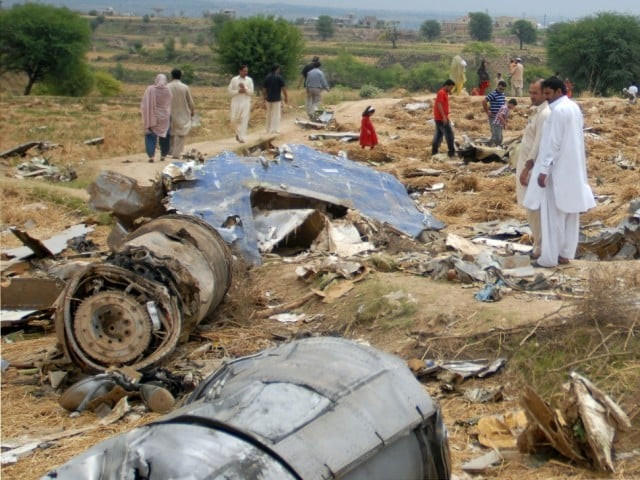Bhoja Air 2012 crash: Victims’ heirs to file criminal case against airline, CAA
Accused parties to be booked under PPC for causing deaths of passengers, crew

“A First Information Report (FIR) will be lodged against them in a local police station for criminal negligence that resulted in the deaths of 127 passengers, including six crew members on board,” advocate Umer Farooq Adam said.
PK-661: Work on shifting debris of crashed ATR starts
“The accused parties will be booked under Pakistan Penal Code (PPC) for causing wrongful death to the passengers and flight crew,” he added.
On April 20, 2012, the airline’s Boeing 737-236 flew from Karachi’s Jinnah International Airport for Islamabad’s Benazir Bhutto International Airport but crashed about 4.2 miles short of the runway close to Hassan Abad near Koral Square – a rural area of Islamabad Capital Territory.
There were no survivors as the aircraft met with complete destruction.
After the incident, the Islamabad High Court (IHC) formed a two-man judicial commission – headed by a retired Supreme Court judge Ghulam Rabbani and including a former air vice marshal Faiz Amir Siddiqi. This commission on conclusion of its probe on July 7, 2014 held the CAA and Bhoja Air’s owners and management responsible for the crash.
The commission listed six misdeeds of Bhoja Air that were largely responsible for the crash.
According to the report, the airlines had obtained the Air Operator’s Certificate (AOC) from the CAA while it could not fulfill 80 to 90 per cent preconditions for the document. The CAA also renewed its Regular Public Transport Licence wrongfully.
The airlines used an aircraft for passengers operations without having appropriate Airworthiness Certificate essential for the passenger aircrafts and thus put the lives and property at peril. Bhoja continued its flights operations beyond April 20, 2012 when it did not fulfill the requirements for AOC. The company’s management also failed to develop an accurate training and need assessment of its flight crew for flying that particular aircraft.
It also failed in keeping informed the flight crew of the crashed aircraft about the deteriorating weather conditions at and around its destination.
The complainant’s counsel categorically said the plane – in terms of its condition neither deserved a CAA licence nor a renewal by the authority. “In real terms, the plane was not at all suitable to be used for the passengers,” he said.
He highlighted the objectionable role of the CAA, against which the commission levelled serious charges and held that the CAA violated its own rules and regulations while issuing the licence to Bhoja Air.
Timeline of major air crashes in Pakistan
The CAA being a regulatory authority was bound to ensure that Bhoja had developed its essentially required infrastructure for running an airline with safety and security of the passengers. However, the fact is that Bhoja did not take proper care of the passengers by adopting careless attitude.
He said the report established with strong and undeniable evidence that the company did not even take appropriate steps to save the lives of its flight crew.
“The commission while pointing out several other wrong doings of the CAA in that particular case also asked it to constitute an independent committee to investigate the causes of the failure of the autopilot system of the plane that proved to be another major reason for the crash,” he added.
The advocate initially tried to get the FIR registered with the Federal Investigation Agency but it directed him to approach the police for the purpose.
Published in The Express Tribune, December 25th, 2016.


















COMMENTS
Comments are moderated and generally will be posted if they are on-topic and not abusive.
For more information, please see our Comments FAQ